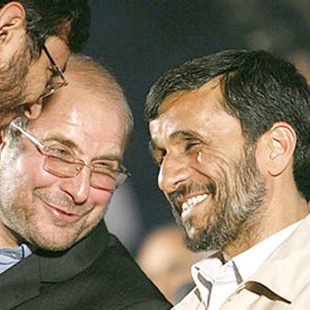The Fortunate No-Show

On Saturday 15th of January, 2010, the pro-Qalibaf newspaper Tehran-e Emrooz excitedly reported that Tehran, along with Guangzhou (China), Lima (Peru), Nantes (France) and Leon (Mexico) had been nominated to receive the sustainable transportation award, presented by the Washington-based Institute for Transportation and Development Policy. The Iranian ministry of foreign affairs, however, opposed Mohammad Qalibaf’s visit to Washington to participate in the award ceremony. Tehran’s award was received last Monday by city council member and former Olympic champion Ali-Reza Dabir.
The Foreign ministry’s decision once again brought into spotlight the silent battle between Qalibaf and Iranian President Mahmoud Ahmadinejad and provided the Iranian media new fodder for analysis. Some pointed out that Mahmoud Ahmadinejad ascended to the presidency from the Tehran mayoralty –and is worried that Qalibaf would adopt the same pattern- and some quipped that the Iranian president has established a monopoly on visits to the US (which he regularly makes for the UN General Assembly in New York).
The saga of 2005 presidential election can be forgotten by anyone but Mohammad-Baqer Qalibaf. Along with Hashemi Rafsanjani, Qalibaf had stolen the limelight and his posters were rampant all across Tehran. However, a few days before the polls opened, a bizarre turn in the political equations of the Principlist camp reoriented support toward Tehran’s low-key mayor Mahmoud Ahmadinejad, and he was the candidate who accompanied –and later defeated- Hashemi Rafsanjani to the second round of election.
Limiting the struggle between Qalibaf and Ahmadinejad to the 2005 presidential election may be short sighted, though that may be at the root of their stormy ties. In 2005, Ahmadinejad moved to the presidential office and Qalibaf –who had resigned from the police force to become the next Iranian president- was appointed to Tehran’s mayoralty. Despite speculations that he was laying the groundwork for the next presidential poll, Qalibaf preferred to remain a bystander in the 2009 presidential election. Ahmadinejad was re-elected to presidency to add a sequel to his arguments with Qalibaf. The tussle between Qalibaf and Ahmadinejad has substantially inflicted the quality of municipal affairs in Tehran: from blocking the city’s metro credit by the government, to the struggle over construction of a monorail (Ahmadinejad’s beloved urban project), from control of the city’s cultural centers to chaos in management of Tehran’s traffic system. Tehran’s development plans are heavily inundated by politics.
In this context, the Tehran municipality was awarded with the sustainable transportation award and Qalibaf was invited to Washington to attend the ceremony. The government’s opposition to the mayor’s trip to Washington dismayed many observers, and revealed the depth of skepticism between the two sides. The Tehran municipality had spent a tiresome year struggling with the government to receive the needed budget to develop the public transportation network. It was perhaps Qalibaf’s nomination for the award, and not the trip per se, that had upset the government. Considering the hardships Qalibaf and his team had endured, receiving the prestigious award, which would be a strong card in future city council and presidential elections, was like a dream: despite the restrictions, fortune had smiled on Qalibaf and his efforts had attracted the attention of an accredited international institute.
The ban was a blessing in disguise: it gave him political accolades. In response to questions about the ban on his trip, Qalibaf replied that one should “not politicize the issue”. But anyone knowing how to read between the lines in Iranian politics understands that even that simple phrase will hurt the feelings of Mahmoud Ahmadinejad and his team, and hearten the pro-Qalibaf citizens of Tehran. Qalibaf had perhaps not predicted that his Bus Rapid Transit and metro development projects could turn him into an overachiever and put a gloss on his brand of ‘honest pragmatism’.
Qalibaf, of course, did not travel to Washington and Mahmoud Ahmadinejad saved his record as the only senior Iranian politician who has visited the United States in office (except for short visits by Iranian economic officials to New York and Manouchehr Mottaki’s visit to Iran’s interest section in Washington.) But what remains in the minds of Iranians, who are the ones who will determine Qalibaf’s political fate, is the government’s behavior and his shrewd, de-politicized response when he remarked: “don’t focus on me going or not, or whether my trip is approved or not. But focus on this, and inform the citizens about it, that what transformation in the public transportation system has occurred that we have achieved this rank. I beg you to have a different look and do not view it from a political vantage point.”

